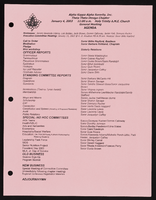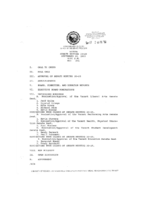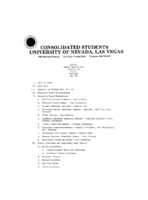Search the Special Collections and Archives Portal
Search Results

Interview with Norma Cox, March 25, 2004
Date
Archival Collection
Description
Narrator affiliation: Administrator, Atomic Energy Commission and Public Health Service
Text
Florence McClure Papers
Identifier
Abstract
The Florence McClure Papers (1969-2007) are comprised of writings, correspondence, newspaper clippings, handwritten notes, and assorted publications that focus on McClure's work with women's organizations, her efforts on behalf of the Southern Nevada Women's Correctional Facility, and her political advocacy work. It also contains a large number of reference clippings McClure collected on women's issues from local, national, and international publications.
Archival Collection

Alpha Kappa Alpha Sorority, Theta Theta Omega Chapter meeting agendas
Date
Archival Collection
Description
From the Alpha Kappa Alpha Sorority, Incorporated, Theta Theta Omega Chapter Records (MS-01014) -- Chapter records file.
Text

Daniel Tafoya oral history interview: transcript
Date
Archival Collection
Description
Oral history interview with Daniel Tafoya conducted by Laurents Bañuelos-Benitez and Barbara Tabach on December 12, 2018 for the Latinx Voices of Southern Nevada Oral History Project. In this interview, Tafoya discusses his early life in Albuquerque, New Mexico. He talks about his father's life story, his educational experience with learning disabilities, and joining the United States Air Force. Tafoya describes his career in the military, and being stationed at Nellis Airforce Base. Lastly, Tafoya discusses with involvement with the Clark County School District (CCSD) and with the Latin Chamber of Commerce.
Text

Transcript of interview with Arby Hambric by Claytee D. White, September 23, 2015
Date
Archival Collection
Description
Arby L. Hambric's book entitled, "To Thee I See: From picking in the fields of Texas to cooking for dignitaries on U.S. Navy ships, a journey I wouldn't change," describes his profound journey from working in the cotton fields as a child to being drafted into the U.S. Navy, before completing high school. During this interview, he recalls the significant achievements of the "Red Tails" and the Tuskegee Airmen. Beginning his 20 year Navy career before military integration, Arby describes the racial tensions that plagued the U.S. Navy in the 1940s, and discusses how he was able to successfully navigate that racist environment for two decades and three war eras. Arby enrolled in San Diego State College after leaving the U.S. Navy. He also worked as maintenance personnel for Sears and Roebuck and started a catering business with his wife. He became a member of the Southern Nevada Enterprise Community, SNEC Board upon moving to Las Vegas, Nevada, after his wife died. With a family legacy he can be proud of, Arby highlights the achievements of his great grandson Taquan Mizzell, a Virginia Cavaliers running back at the University of Virginia. As a Navy veteran, Arby often volunteered his time and resources to help others in need. He recalls driving the sick and elderly back and forth from the Westside community to Valley Hospital or University Medical Center, UMC. He also discusses government enforced road closures and a wall that was built to block Blacks from entering the new downtown. This interview sheds new light on military integration and offers key strategies for overcoming environmental racism. Arby mentions a documentary about the closing of the wall and offers his predictions on the future of the Westside.
Text

Interview with Robert Rex Brownlee, August 6, 2007
Date
Archival Collection
Description
Text

Meeting minutes for Consolidated Student Senate University of Nevada, Las Vegas, September 20, 1990
Date
Archival Collection
Description
Text

Meeting minutes for Consolidated Student Senate, University of Nevada, Las Vegas, September 7, 1982
Date
Archival Collection
Description
Text

Transcript of interview with Peggy Huber by Greg Pushard, March 14, 1981
Date
Archival Collection
Description
On March 14th, 1981, collector Greg Pushard interviewed postmaster Peggy Huber (born March 31st, 1884 in Conway, Arkansas) in her home in Las Vegas, Nevada. This interview covers Peggy’s life in Nevada and also offers an insightful overview of Nevada’s rich history. During this interview Peggy discusses life on the ranch, mining, settlement, and the local early aboveground atomic blasts.
Text

Meeting minutes for Consolidated Student Senate University of Nevada, Las Vegas, March 21, 1985
Date
Archival Collection
Description
Text
